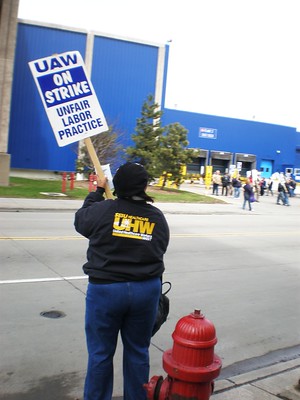In the fast-paced world of the automotive industry, the United Auto Workers (UAW) union is no stranger to negotiating with major automakers. However, the recent contract talks between the UAW and industry giants GM, Ford, and Stellantis have taken center stage as they attempt to prevent a potentially devastating strike from widening. In this article, we’ll delve into the latest developments in these negotiations and examine whether a deal can be reached before the situation escalates further.
The Importance of UAW Negotiations
The UAW, representing thousands of auto workers, plays a pivotal role in shaping the conditions and terms under which employees in the automotive sector work. Their negotiations with automakers are crucial for determining wages, benefits, working conditions, and more. These talks can have far-reaching implications, not only for the workforce but also for the industry as a whole.
The Stakes for GM, Ford, and Stellantis
For GM, Ford, and Stellantis, the outcome of these negotiations is equally significant. Disruptions in production due to strikes can result in substantial financial losses, negatively impacting not only the companies themselves but also suppliers and dealerships. With the automotive industry already grappling with supply chain challenges and the transition to electric vehicles, a prolonged strike could exacerbate existing issues.
The Current State of Negotiations
As of the latest updates, the UAW and the three automakers have been engaged in intense negotiations, seeking common ground on various issues. These include wages, healthcare benefits, job security, and investments in domestic manufacturing facilities. Both sides are under pressure to find compromises that will satisfy the workforce while ensuring the companies’ long-term sustainability.
Potential Consequences of a Wider Strike
If an agreement is not reached soon, the UAW could decide to escalate the situation by calling for a broader strike. Such a move could significantly disrupt production across multiple plants, leading to layoffs and supply chain interruptions. These consequences would be felt not only by the automakers but also by thousands of employees and their families.
Industry-Wide Implications
The ripple effect of a widespread strike in the automotive industry would extend beyond just the UAW and the three major automakers. Smaller suppliers, dealerships, and other related businesses would also suffer, potentially resulting in layoffs and financial challenges. Furthermore, consumers might face delays in vehicle deliveries and limited choices in the market.
The Path Forward
To avert a wider strike and its potential consequences, both the UAW and the automakers must find common ground and work together to address the key issues at hand. Negotiations will continue, with each side striving to reach an agreement that balances the interests of the workers and the companies.
Conclusion
The ongoing contract talks between the UAW and major automakers GM, Ford, and Stellantis are currently at a critical juncture. The outcome of these negotiations will not only determine the fate of thousands of auto workers but also have significant implications for the broader automotive industry. As stakeholders anxiously await news of a potential deal, the hope is that both sides will find a compromise that ensures the industry’s stability and prevents a wider strike from becoming a reality. Stay tuned for updates on this crucial development in the world of automotive manufacturing.












